Over the past few weeks there has been claims circulating within social media regarding “incessant violence and property destruction” coming out of peaceful protests that support Black Lives Matter and condemn police brutality.
Time and time again, stories and reports have come out regarding potential flash-points of violence around the country. On July 16, 2020, there was a Congressional hearing before the Intelligence & Counterterrorism subcommittee on “Assessing the Threat from Accelerationists and Militia Extremists.” In his opening statement, Chairman Max Rose (D-NY) emphasized that violence of any kind, regardless of party or political affiliation, should be condemned and investigated. He noted that the purpose of the hearing was to assess a range of “violent anti-government actors, movements, and organizations, highlighting recent threats from militia extremists and accelerationists, including the Boogaloo movement, who seek to accelerate society toward violent collapse.” Chairman Rose further added that, “Anti-government extremism is one of the common threads – but we often see overlap with anti-immigrant, anti-Semitic, anti-Black, anti-Muslim ideologies as well, bringing these extremists into common cause with white supremacists.”

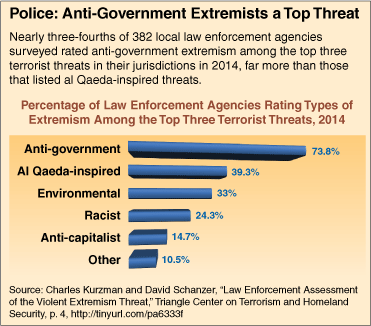
“Anti-government extremism is one of the common threads – but we often see overlap with anti-immigrant, anti-Semitic, anti-Black, anti-Muslim ideologies as well, bringing these extremists into common cause with white supremacists.”
Chairman Max Rose, Hearing Statement
Chairman Rose also noted that the hearing was an opportunity to explore how these ideologies “flourish in our communities and in online spaces.” He went on to cite various incidents in which members of the Boogaloo movement were implicated. From possession of so-called ghost guns (guns without serial numbers) to the murder of a Federal Protective Service officer and a Santa Cruz County police officer, to plans to incite violence at Black Lives Matter protests. When investigating these threats, Chairman Rose also added, “It’s also vital that we understand these movements are not evolving in a vacuum and, particularly in an election year, we can’t disregard the risk that anti-government extremists—either wittingly or unwittingly may latch on to narratives and conspiracies propagated by Russia and other adversaries who seek to further social divisions.”
“It’s also vital that we understand these movements are not evolving in a vacuum and, particularly in an election year, we can’t disregard the risk that anti-government extremists—either wittingly or unwittingly may latch on to narratives and conspiracies propagated by Russia and other adversaries who seek to further social divisions.”
Chairman Max Rose, Hearing Statement
Next to speak was Rep. Mark Walker of North Carolina. He noted that there is a global “uptick in extremist ideology, particularly linked to violent white supremacy and anarchy.” He further added that the overlap of extremist ideologies, in particular the Jihadist movement, lends to the sharing of tactics, methodologies, rhetoric, and propaganda that seeks to encourage acts of extremism and violent against the government and innocent citizens across the country. Rep. Walker also included Antifa as a movement that needed to be analyzed alongside these other threats. Although he acknowledged that it is not an organization, but a lose coalition of people with a similar ideology, it remains a growing movement.
Chairman Bennie G. Thompson’s opening statement echoed the points of both of his colleagues. However, he made sure to emphasize that, “we shouldn’t be swayed by political winds.” He went on to note that it goes without saying that “any and all violence linked to Antifa should be condemned but public reporting, arrest records, and the government’s own reporting all indicate that right-wing extremists pose a more urgent and lethal threat to Americans.”
“Any and all violence linked to Antifa should be condemned but public reporting, arrest records, and the government’s own reporting all indicate that right-wing extremists pose a more urgent and lethal threat to Americans.”
Chairman Bennie G. Thompson, Hearing Statement
The subcommittee then moved onto hearing from its expert witness panel:
- Ms. JJ MacNab, Fellow, Program on Extremism, The George Washington University
- Heidi Beirich, Ph.D., Co-Founder and Executive Vice President, Global Project Against Hate and Extremism
- Mr. John Donohue, Fellow at Rutgers University Miller Center for Community Protection and Resiliency, Former NYPD Chief of Strategic Initiatives
JJ MacNab is one of the foremost experts in the country on anti-government extremism and militia groups. Dr. Heidi Beirich has more than two decades of experience studying and fighting extremism, including leading the Southern Poverty Law Center’s intelligence project. John Donohue, as former Chief of Strategic Initiatives of the New York Police Department, brings his breadth of experience to the hearing.
Quotes pulled from their opening statements:
- “There is a potential street war brewing.” -Ms. MacNab
- “The FBI now considers the risk of violence from white supremacists groups as ‘on the same footing as those of foreign terrorists like ISIS’.” -Dr. Beirich
- “It is likely that the violence will intensify as we approach the November presidential elections.” -Dr. Beirich
- “Nothing is going to stop this movement’s growth and violent activity if we don’t accept that the online platforms are driving extremism.” -Dr. Beirich
- “What is recently observable from social media data is that there is an exponential growth in participation in the cyber-social domain coalesced around revolutionary and extremist themes at either ends of the ideological spectrum.” -Mr. Donohue
- “Memes shared on the Boogaloo message boards gamify assaults on law enforcement, encouraging violence through jargon known in the video gaming community.” -Mr. Donohue
The hearing moved into questions for the witness panel. Chairman Rose by asking each witness where they would measure the threat of Jihadist fundamentalism right now and what they envision as the “worst case scenario” if we fail to act.
Mr. Donohue responded that it is the power of the online messaging and propaganda of these extremism groups that make them so dangerous. “The power of the messages are so virulent that they make sense to certain people and that is where we need to have the ability to have visibility into those networks and the people that are motivated to violence.”
Dr. Beirich noted that her concerns are primarily two-fold. She first echoed Ms. MacNab’s concern that the situations at protests around the country are exceedingly volatile and incendiary with so many armed participants facing off with drastically different goals and values.
However, her most pressing concern is “mass casualty attacks” like we’ve seen in El Paso, Pititsburgh, Poway, and other places. These attacks have been propagated by “The white supremacists who have come to believe that they need to use terrorism, violence, to bring down systems of government, multicultural democracies basically, to stop a white genocide. That has motivated most of the big mass casualty attacks and that motivation is not going to go away, because demographics are shifting in much of the Western world and that’s what they view as a threat.” She further added that if we fail to intercept the types of propaganda that fuel these hateful and extreme ideologies that she has a great fear that the “next Christchurch could be a round the corner anywhere, here or abroad.”

“The white supremacists who have come to believe that they need to use terrorism, violence, to bring down systems of government, multicultural democracies basically, to stop a white genocide. That has motivated most of the big mass casualty attacks and that motivation is not going to go away, because demographics are shifting in much of the Western world and that’s what they view as a threat.”
Dr. Beirich
Ms. MacNab asserted that she thinks we are “facing an uphill battle here” when it comes to trying to identify, track, and police such extremist groups online and added that “trying to police this would be impossible.” She did note that she thinks tackling the larger sources of propaganda on platforms like Facebook would certainly make a dent in the growth of these movements. Ms. MacNab went on to say, “I don’t think there’s a large risk of these groups ever coming together and forming a kind of a private army, but I am very concerned of small-cell terrorism.” She noted that “protesters are at risk, police officers are at risk, and possibly infrastructure.”
Rep. Walker was next to address questions to the panel. He began by asking Mr. Donohue to pull from his three decades of NYPD experience to talk about why law enforcement is a common target of violent extremist groups, the impact that has on law enforcement, and how the current environment is impacting law enforcement and their families. Mr. Donohue responded that most often law enforcement are targeted because such acts are done to be sensational and the goal is to attack the most visible arm of government.
Rep. Walker then referenced the upcoming research on left-wing groups and anarchists that Mr. Donohue is currently working on to ask if there was anything that he could tell the subcommittee about this work and if he was specifically “looking at violence and destruction linked to the various militia groups or militia extremists that have occurred over the past few months.” However, Mr. Donohue noted that the research is not yet complete and he did not want to speak too much on it until it is finalized, although he did reference his opening statement where he mentioned that “there has been an exponential growth in both far-left and anarchist social media participation that is anti-police and anti-government.”
The next question Walker posed to the panel was directed at Ms. MacNab. He referenced her concern that the passage of gun regulation legislation or the loss of President Trump in the election might lead to “civil unrest” and asked if that is something that she has seen in her research and if she could unpack those concerns a little bit.
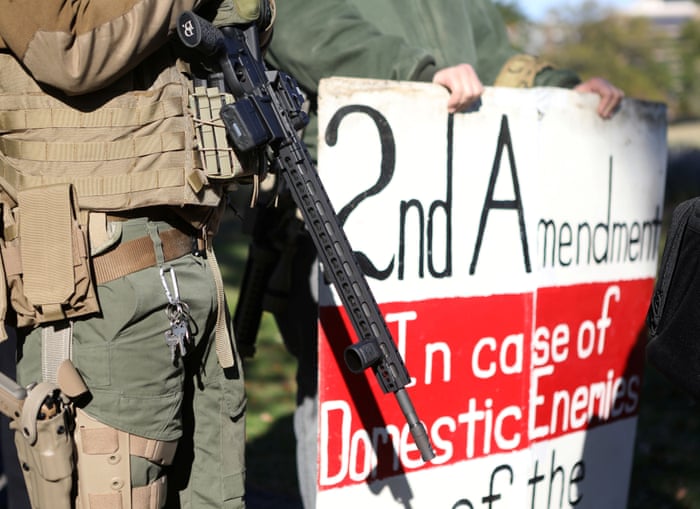
Her response brilliantly separated those two situations as very distinct and different issues. She noted that gun legislation has been a “hot issue for anti-government extremism for decades” and that it has always been a concern. She emphasized that one of the factors that “pushed McVeigh to move forward was a restriction on assault rifles.” However, she also made sure to point out that, “most gun owners are not violent, most gun owners are not extremists” but noted that for many people in these anti-government extremism groups, gun control legislation is one of the few issues that they can come together on. As for the election, Ms. MacNab made the point that many of these extremists support President Trump and have been pleased with his administration, yet have for years talked about a coming civil war should he not continue.
Rep. Walker directed his next question towards Dr. Beirich, “How can we as a society and government best show support for law enforcement as they face the challenge and what maybe additional training tools and authorities do they need?”
Dr. Beirich’s answer centered on recognizing that law enforcement is the most visible and accessible arm of the government, has been historically targeted for that reason, and continues to be the primary targets of anti-government extremism. She believes that there needs to be a “lot of study of enhancing authorities for them.” For instance, one avenue would be to “…apply the foreign terrorist organization designation to international white supremacist networks that would allow law enforcement to use a whole lot of other tools than they do right now to combat this threat.” However, she emphasized that such avenues need to be investigated and that she has deep concerns about the “civil rights implications if those tools aren’t used in the right way.”
Chairman Thompson was next in line to ask questions of the expert panel. He began by questioning how we can get the various social media platforms where these ideologies grow and spread to “assume an enhanced responsibility for managing content, respecting civil rights and civil liberties.”
Mr. Donohue noted that policing online content is an impossible job for law enforcement, so of course some of the responsibility falls on the companies that operate these social media platforms to provide oversight. However, he also noted that we have to work with communities that use these platforms in order to empower them in coordination with the companies to police them internally.
Dr. Beirich suggested that, “Congress call the tech companies to account for what’s in their terms of service and how they’re enforcing those terms of service.” She added that most of these companies have “claimed not to monetize hate content, not to host a lot of aspects of white supremacy, and yet we keep finding it, and finding it, and finding it.” She also referenced the Raise the Bar Act, which is modeled after the European Union’s response to such threats, as something that would probably be good.
The last point that she made really drove home a major issue that can easily be overlooked. Dr. Beirich cautioned, “It really shouldn’t be up to civil rights organizations that are small and underfunded to have to play this role in our society.”
“It really shouldn’t be up to civil rights organizations that are small and underfunded to have to play this role in our society.”
Dr. Heidi Beirich
Ms. MacNab seconded Dr. Beirich’s point here. She argued, “One problem is these organizations chase the news, so if there is a sudden influx of news about the Boogaloo’s, then Facebook comes in and does a purge of some of the more violent Boogaloo groups. The problem is the news doesn’t often know what’s going on in private groups, in direct messages, and even some of the public pages.” We can see how this played out when Facebook took down some pages affiliated with the “Proud Boys” in 2018 after members got arrested for fighting with masked protesters who were apparently part of an anti-fascist coalition known as Antifa.
It wasn’t until after Facebook took these actions that the FBI declared the “Proud Boys” a hate group, which a high-ranking member of the FBI in Oregon contradicted a month later by claiming that the agency did not recognize the group as an extremist group.
Ms. MacNab went on to detail how she has spent a long time developing a broad web of contacts in this world so that she can get glimpses into these types of groups and pages. She noted that what they post is “shockingly bad” but because the news is not in these groups and does not report on it, then Facebook and other companies simply “let it fester.”
“The Boogaloo isn’t really a movement, it’s a dress code, it’s a way of talking, it’s jargon. The people who belong to it came from other extremist groups, usually on Facebook…and yet they’re treated as a separate movement and the problem is you’re ignoring the underlying areas that they came from.”
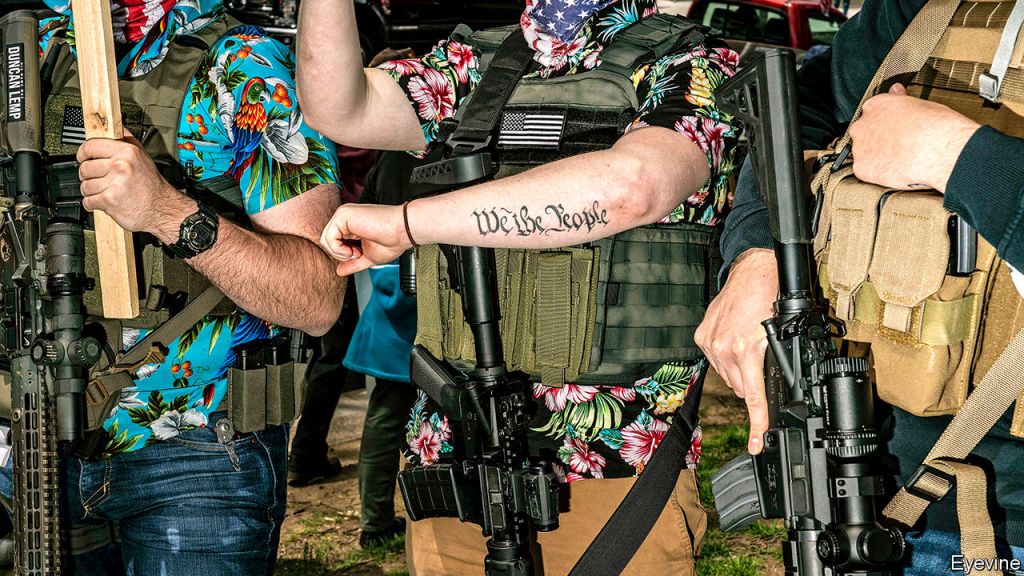
“It’s not really up to civil rights groups or even the news to be able to monitor all of these things so there has to be some external group.”
Representative Elissa Slotkin of Michigan was next to pose questions. She referenced the recent protests in Lansing, the four-fold increase in Michigan in incidents of hate-based crime and violence, and noted that at least twenty-seven hate groups are present in the state. Rep. Slotkin added that she has seen a rise in the presence of the so-called “Proud Boys” group and asked Mr. Donohue what he could tell the subcommittee about them. He actually deferred to one of the other panelists as he said that he was not specifically familiar with the group.
Before we continue, it is critical to emphasize how important Mr. Donohue’s choice was to defer to one of his fellow panelists that may be more educated on the topic. This is something that everyone can benefit from and actively practice. We do not always have to comment our thoughts and feelings on topics that we are ignorant about. Unfortunately, we are often defensive when we are told that we do not know something. It is imperative that we realize and dismantle this defensiveness of our own ignorance. Instead, we should replace such reactions with curiosity and inquisitiveness.
Dr. Beirich responded to Rep. Slotkin’s question that during her time at the Southern Poverty Law Center they added the “Proud Boys” organization to their list of hate groups, “largely on the basis of very ugly anti-muslim thinking.” She went on to say that the Proud Boys are in some ways a precursor to the type of activism that we are currently seeing in the Boogaloo Boys. Dr. Beirich even referenced the recent move by the Canadian military to ban its members from being part of the Proud Boys as an example of how seriously other countries are taking the threat.
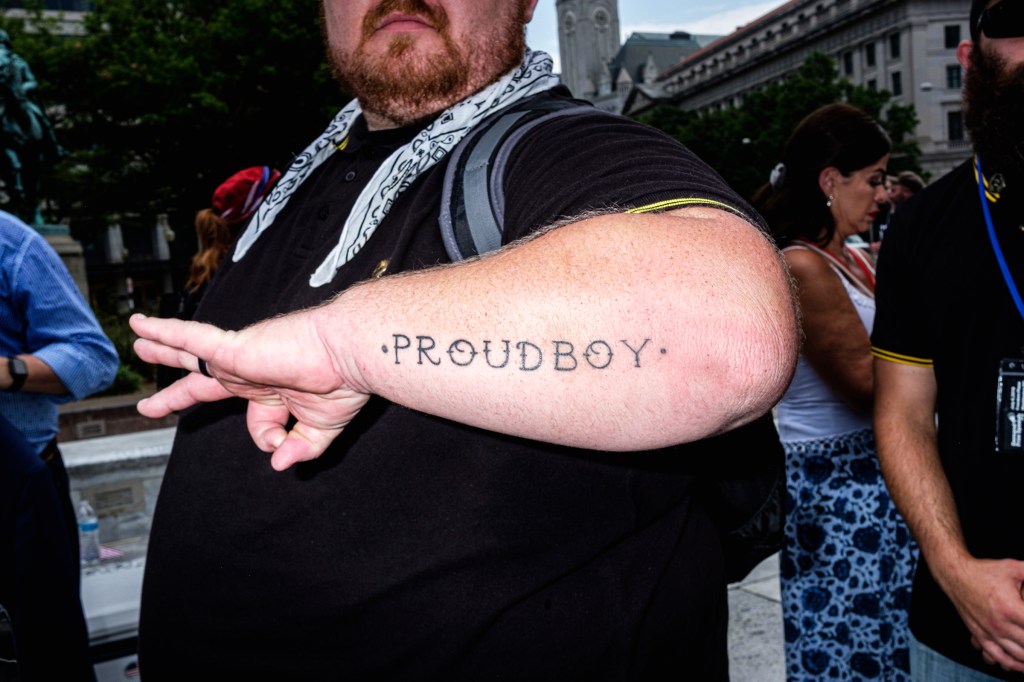
Afterwards, Rep. Slotkin moved on to Ms. MacNab, referencing the May 31st protest in front of a police location in Lansing, Michigan that was in response to the George Floyd murder. She noted that there were a number of armed men in Hawaiian shirts, the “dress code” of the Boogaloo boys as previously mentioned by one of the panelists, and asked Ms. MacNab to talk a bit about them and what can be expected if they are active in Michigan. MacNab reemphasized the point that the Boogaloo boys are not a cohesive movement or group, so it is important not to pre-judge these men for what they are at these protests to do.
Rep. Sheila Jackson Lee asked the entire panel what they envision as the results if we fail to address these threats. All of the panelists agreed that these ideologies and hate groups are dangerous if left to their own devices, but each of their answers also provided a different perspective on how we can keep these kinds of groups in check. Mr. Donohue argued that civility at protests is needed. He said that even though petitioning the U.S. government in that way is the right way to exercise one’s rights and express “righteous rage”, these groups prey on larger movements and can more easily incite violence and rioting in ignitable crowds.
Dr. Beirich was concerned that if gone unchecked what we will see is more “mass terrorist attacks like we saw in El Paso…more hate crimes…more terrorists taking advantage of current conditions.”
Ms MacNab noted that, “My biggest fear is that there will be acts of terrorism at active protest places, it will put a damper on people willing to go there, it will make people afraid to actually go into the streets and protest. That’s terrible for our system of democracy.” She again echoed her concern that we are approaching an all-out “street war.” Ms. MacNab also noted that we shouldn’t have to wait for Homeland Security research memos to be leaked to know what our government knows and thinks about these groups, and recommended that some sort of papers be put out detailing these groups, who they target, and how they’re dangerous.
For his second round of questions Rep. Walker asked of the panel, “Can you explain what type of access and authorities you think the government or individual law enforcement agencies should have to track certain social media posts? Do you think they have sufficient authority to do this now?”
Ms. MacNab noted her heavy concern for giving police and law enforcement more authority to monitor and review things said by citizens, citing “It is a problem area, it can be abused.” She further added, “Unfortunately, we are still on this left-right idea whereas we should be looking at this as violent fringe. I think police have a little bit of a blind spot for right-wing that they don’t have for left and I think they need to be looking at right-wing even more than left at this moment because that’s where the violence is.”
“Unfortunately, we are still on this left-right idea whereas we should be looking at this as violent fringe. I think police have a little bit of a blind spot for right-wing that they don’t have for left and I think they need to be looking at right-wing even more than left at this moment because that’s where the violence is.”
Ms. MacNab
Rep. Walker asked Ms. MacNab if she could unpack her point about police having a blind-spot. In response she noted that if you analyze various street protest videos you will see “a line of police officers separating left-wing protesters and right-wing protesters, if you watch the police officers have their back to heavily armed people standing behind them and they’re facing left-wing [protesters] with the assumption that left-wing is what’s going to harm them, whereas the people standing behind them have some pretty rabid anti-police ideas as well.”
“…if you watch the police officers have their back to heavily armed people standing behind them and they’re facing left-wing [protesters] with the assumption that left-wing is what’s going to harm them, whereas the people standing behind them have some pretty rabid anti-police ideas as well.”
Ms. MacNab
She further added that there’s a number of police officers with 3% tattoos or wearing Oath-keepers patches, “these are extremist groups. Police need to be aware that some of these extremist groups want to kill them and that’s unfortunately not really coming through.”
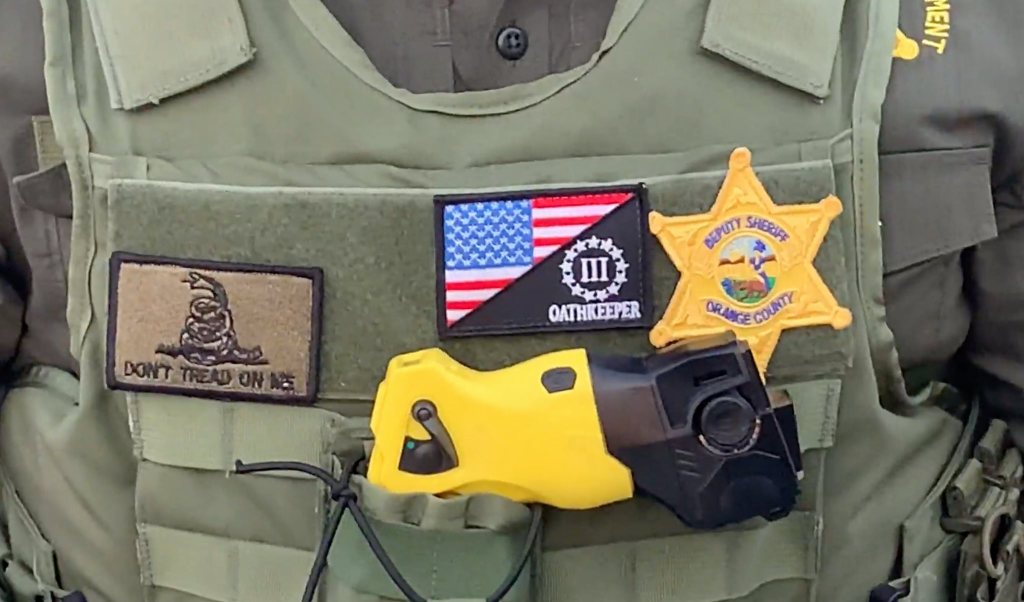
Dr. Breirich’s answer launched into a brief history of her work during the previous two administrations in which she urged federal law enforcement not to abandon the monitoring of right-wing extremism. She noted, “After 9/11…looking at right-wing extremism was essentially dropped, in fact there was a division at DHS of people who created intel on right-wing extremism that was shut down in the early years of the Obama administration.”
“After 9/11…looking at right-wing extremism was essentially dropped, in fact there was a division at DHS of people who created intel on right-wing extremism that was shut down in the early years of the Obama administration.”
Dr. Beirich
Rep. Walker interrupted momentarily, “I didn’t mention right, I just said tracking extremist content and imminent violence on social media as a whole, whether it’s from the left or the right as far as what kind of tools and access authority should have in doing so.”
Dr. Breirich clarified, “Well the reason I’m saying this is the facts are right now that right-wing extremism is the bigger problem, if we were talking about the 1960’s I would not debate whether there was mass left-wing violence. I just think that the focus has to be there, that’s where the deaths are coming from. It could change tomorrow, but right now that’s the problem and that’s what needs to be battled in the online space.”
Mr. Donohue somewhat echoed that point as well. He said, “I think no side, and I hate to use that as the example, but no one along the spectrum has a monopoly on hate and a monopoly on violence.” Speaking to the question of if law enforcement currently has the authority and tools to track these types of groups, “I think there are authorities that exist within the federal government.”
He pointed to the Attorney General’s guidelines for domestic intelligence as one example, though right-wing extremism seems less important to the Department of Justice and the president than these panelists would recommend. Mr. Donohue also noted the FBI guidelines as well as those set out by the Department of Homeland Security (DHS).
Rep. Walker thanked the panelists for their strong answers and suggested to Chairman Rose that they plan a hearing to get an update from DHS on the work that they are doing.
Chairman Rose fully agreed with Rep. Walker and summarized, “It is clear that extremism is now threatening the lives of our law enforcement officials across the country. Notice I say extremism, again you and I have made a commitment, and I respect you Mr. Walker for this, to not politicize our efforts.” He added, “Extremism is also affecting people’s constitutional rights to congregate and be heard and this extremism is undeniably amplified and put on steroids by social media.”
“It is clear that extremism is now threatening the lives of our law enforcement officials across the country. Notice I say extremism, again you and I have made a commitment, and I respect you Mr. Walker for this, to not politicize our efforts. Extremism is also affecting people’s constitutional rights to congregate and be heard and this extremism is undeniably amplified and put on steroids by social media.””
Chairman Max Rose
Chairman Rose asked the panel,”If Congress does not do anything to crack down on what is happening, and across the spectrum, are we putting the lives of law enforcement officials and law-abiding Americans unnecessarily at risk?”
The panel unanimously agreed that if Congress does nothing to stem the spread of extremism law enforcement officials and law-abiding Americans will die.
Rep. Jackson Lee’s second line of questioning asked panelists to focus on how important it is for the government to do something about these threats.
Dr. Breirich responded, “The racial justice movement, the Black Lives Matter movement, is a particular target of these organizations. Obviously, if you’re a white supremacist you don’t care for racial justice and these are people who you want to stop from expressing their views and reforming American democracy in a positive direction. The government needs to be paying attention to this.”
She added, “The fusion centers, law-enforcement investigative agencies and so on, need to be watching these movements very very carefully, monitoring where they’re getting into violence in the online space. They need to be working with academics and others who study these movements to keep on top of these trends and I feel strongly that the government needs to bring some oversight to the online space to sort of pressure the companies to be better on this front.”
“The racial justice movement, the Black Lives Matter movement, is a particular target of these organizations. Obviously, if you’re a white supremacist you don’t care for racial justice and these are people who you want to stop from expressing their views and reforming American democracy in a positive direction. The government needs to be paying attention to this.”
Dr. Heidi Beirich
You can view the entire hearing here.

